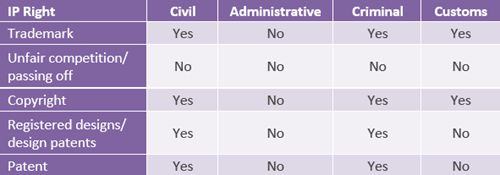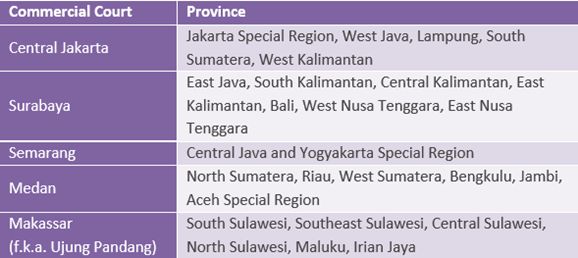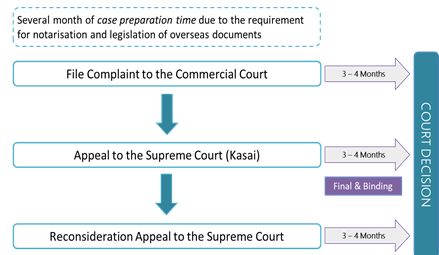A brief guide addressing common questions and concerns of the IP litigation and enforcement landscape in Indonesia
To download the guide, please click here.
To see other released IP Litigation & Enforcement guides on separate jurisdictions, please click here.
Is your jurisdiction a common law or civil law jurisdiction?
Civil law jurisdiction.
What methods are there for enforcing IP rights in your jurisdiction?

What courts have jurisdiction to handle civil IP cases?
Civil IP cases should be filed at the Commercial Court, Commercial Courts is a special chamber at the first instance level which handle matters concerning bankruptcies, bank liquidations, and intellectual property.
While appeals are filed at the Supreme Court. Jurisdiction for infringement is based on the domicile of the defendant.
Currently there are five (5) Commercial Courts in Indonesia, with legal jurisdictions according to President Decree No. 97 of 1999 as follows:

If the right-holder is domiciled outside Indonesia, the case must be filed with the Commercial Court of Central Jakarta.
Is there any bifurcation of proceedings? For example, for determining validity or damages?
Invalidity and infringement can be tried in the same forum - the commercial court. A counterclaim for invalidation of a patent can be brought against a claim for patent infringement. However, note the caveat that invalidation can only be brought before the Patent Office's Patent Appeal Commission if the patent is still within the nine-month period from grant. The Commercial Court only has jurisdiction after the nine-month period from grant.
What are procedures for civil enforcement?
For a civil case, the lawsuit should be filed at the Commercial Court in the jurisdiction covering the IP infringer's domicile. However, civil enforcement may not be the best medium for anti-counterfeiting actions. The best use of civil courts in major infringement cases has been to establish a principle, such as enforcing a difficult or complex mark.
Is a power of attorney needed for civil action to be brought? If so what are the procedures and time lines?
Yes, a power of attorney is needed. The notarised and legalised power of attorney must be ready at the time of filing the lawsuit. At this time, it is also necessary to provide notarised and legalised copies of the documents to be used to support the signing authority of the person signing the power of attorney.
What is the average time to trial in a civil case?
IP civil cases are generally completed within the statutorily prescribed periods. Patent cases are generally heard within six months. Cases for all other IP matters are heard within three months.
What is the language of the proceedings? Is there a choice of language?
Language of the proceedings are in Bahasa Indonesia. No other language is recognised by Indonesian courts.
Is it possible to apply for summary judgment?
There is no summary judgment system in Indonesia.
On what basis are interim injunctions granted?
In addition to stopping entry of suspected goods and securing evidence, preliminary injunction can be requested to secure and prevent the removal of said evidence.
Although interim relief is theoretically available, there is only one case has been granted such, and it was overturned on appeal. Thus, it is difficult to measure the chance to obtain such relief in practice.
On what basis are permanent injunctions granted?
An order to stop infringement is usually granted where an infringement is proved. In cases where infringement is proved but the damages award is denied because of failure to prove the losses suffered, the court will still grant a permanent injunction.
What appeal procedures are available from a first instance judgment?
Appeals against the judgement of the Commercial Court is to be filed to The Supreme Court.

Grounds for appeal:
1. Cassation Appeal Grounds:
If the Lower Court was :
- incompetent or exceeded competency limits;
- wrongly applied or violated prevailing law;
- failed to fulfil the conditions required by the legislation which may result in the revocation of the relevant decision.
(Article 30 of Law No. 14 of 1985 on Supreme Court)
2. Reconsideration Appeal Grounds:
- If decision based on a lie/ruse known after case decided or based on evidence which was later declared as false by a criminal judge;
- If after case decided, there was vital evidence that was not found earlier;
- If the judges granted a matter that is not claimed/granted more than claimed;
- If a part of claims has not been decided without considering its causes;
- If a case between the same parties, concerning the same matters, based on the same grounds, by the same Court or other court in the same level, has been given a decision which is contrary to each other;
- If there was a Judge's oversight or obvious mistake.
(Article 67 of Law No. 14 of 1985 on Supreme Court)
What are the procedures for criminal enforcement?
For IP infringement-related offences, the IP owner must file a formal complaint with the authorities before any action can commence. Police raid actions are also viable, but only under a narrow set of circumstances. After a raid, IP holders can either reach a settlement with the infringer or pursue the complaint via criminal prosecution.
What are the procedures for criminal appeals?
Criminal claims are under jurisdiction of District Court. Appeal against District Court decision shall be filled with the High Court that has the same territorial jurisdiction as the district court where the claim was submitted.
Parties have the right to appeal a judgment, unless specified otherwise (Article 21(1), Law No. 4 of 2004 regarding the Powers of the Judiciary). The judgment of the high court can be further appealed to the Supreme Court. A decision of the Supreme Court is final and binding but may still be subject to judicial review in some cases.
Within 14 days from a Judgement being made by the District Court, an application for appeal may be filed to the Supreme Court. That Court must make its decision within 30 days from the time the appeal is received
Grounds for appeal:
No specific grounds for appeal regulated by law. Appeals cannot be brought against final and binding decisions (judicial review is available but is not technically an appeal).
What are the procedures for administrative enforcement?
Indonesia does not use administrative remedies.
What are the measures for Customs border protection?
Trade mark and copyright holders can file customs recordal applications, which allows Customs officials to detain goods which they suspect are counterfeit. Customs recordal applicants can only be made by Indonesian rights holders. A customs recordal will only last for 1 year, with an option to renew for 1 year.
What IP treaties is your jurisdiction a member of?
- Madrid Agreement
- WTO - TRIPS Agreement
- WIPO - Performances and Phonograms Treaty
- WIPO - Copyright Treaty
- WIPO - Trademark Law Treaty
- Berne Convention
- Paris Convention
- Patent Cooperation Treaty
Further reading:
Guides:
- Patent protection overview in four major ASEAN countries
- E-filings and hearings in Courts in South East Asia
- Patent litigation in Indonesia: overview
Articles:
- Indonesia: New amendments to IP laws
- Government compulsory licensing in Indonesia
- Digital transformation in Indonesia
The content of this article is intended to provide a general guide to the subject matter. Specialist advice should be sought about your specific circumstances.


